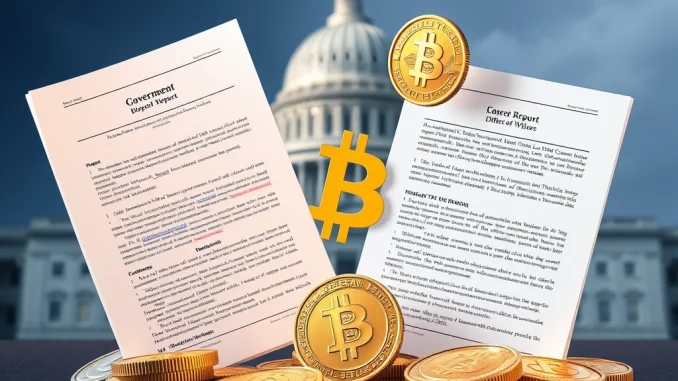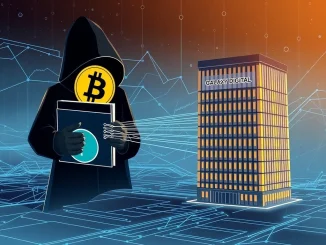
The intersection of politics and cryptocurrency is heating up, especially concerning figures like Donald Trump. Recent actions by the House Democrats have brought increased attention to Trump crypto ventures, signaling a new phase of regulatory scrutiny. This move highlights the growing interest from lawmakers in understanding the financial flows and potential risks associated with political figures engaging in the digital asset space.
Why House Democrats Are Requesting Information
Leading members of the House of Representatives have formally requested information from the U.S. Treasury Department regarding financial activities tied to former President Trump’s crypto-related projects. The core of their request centers on obtaining Suspicious Activity Reports (SARs). SARs are crucial tools used by financial institutions to flag transactions that appear unusual or potentially indicative of illicit activity, such as money laundering or fraud. By seeking these reports, Democrats aim to uncover any red flags or irregular patterns in the financial dealings connected to Trump’s digital asset endeavors.
Understanding Suspicious Activity Reports (SARs)
SARs are confidential documents filed by banks and other financial institutions with the Financial Crimes Enforcement Network (FinCEN) when they detect transactions that meet certain criteria suggesting potential illegal activity. These reports are not proof of wrongdoing but serve as alerts for law enforcement and regulatory bodies to investigate further. The request for SARs related to Trump crypto activities suggests that lawmakers have specific concerns that warrant a deeper look into the financial mechanics of these ventures.
Focusing on Specific Trump Crypto Projects
The inquiry specifically names two projects linked to Donald Trump:
- World Liberty Financial (WLFI): Described as a blockchain project, the exact nature and activities of WLFI are under scrutiny. Lawmakers likely want to understand its operations, funding, and how it interacts with traditional financial systems or other crypto platforms.
- The TRUMP memecoin: This highly volatile digital asset, often associated with political figures or themes, has seen significant price swings. The focus on the TRUMP memecoin suggests concerns about its issuance, promotion, trading activities, and whether these align with financial regulations and campaign finance laws.
The request for SARs on these distinct projects indicates a broad interest in various facets of Trump’s involvement in the crypto market, from potentially structured projects like WLFI to the more speculative world of political memecoins.
Raising Concerns: Campaign Finance, Bribery, and Securities
The letter from House Democrats outlines several key areas of concern regarding these crypto ventures:
- Campaign Finance Laws: Questions arise whether activities related to these crypto projects, particularly the TRUMP memecoin, could constitute undeclared campaign contributions or expenditures, potentially violating regulations designed to ensure transparency in political funding.
- Bribery: While less detailed in public reports, concerns about bribery could relate to how these projects might be used, or perceived to be used, to influence political processes or decisions.
- Securities Regulations: The nature of WLFI or the TRUMP memecoin could potentially fall under the definition of securities, triggering requirements for registration and disclosure under U.S. law. Failure to comply could lead to significant legal consequences.
These concerns underscore the complex legal and regulatory landscape that political figures navigate when engaging with novel asset classes like cryptocurrencies.
The Broader Context of Crypto Regulation
This specific request by House Democrats fits into a larger picture of increasing governmental focus on Crypto Regulation in the United States. Lawmakers and regulatory bodies are actively debating and implementing rules to address issues like consumer protection, market integrity, and preventing illicit finance within the crypto space. The scrutiny on Trump’s crypto activities can be seen as an example of how this broader regulatory push is being applied to specific cases, particularly those involving high-profile individuals.
What Happens Next?
The Treasury Department will review the request for Suspicious Activity Reports. The process for releasing such information, especially when related to ongoing or potential investigations, can be complex and may not result in immediate public disclosure. However, the act of making the request itself signals the intent of House Democrats to probe deeper into the financial underpinnings of Trump crypto ventures and their potential implications for legal and ethical standards in politics.
Conclusion
The request by House Democrats for Suspicious Activity Reports on Donald Trump’s crypto projects, including WLFI and the TRUMP memecoin, marks a significant development in the ongoing intersection of politics and digital assets. It highlights concerns about potential violations of campaign finance, bribery, and securities laws. This move underscores the growing importance of Crypto Regulation and the increasing scrutiny placed on how public figures engage with the crypto market. The outcome of this inquiry could have implications for both political finance and the regulatory treatment of certain types of crypto assets.



